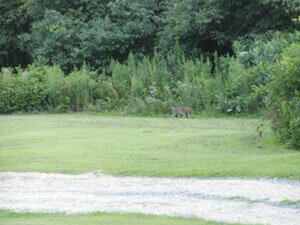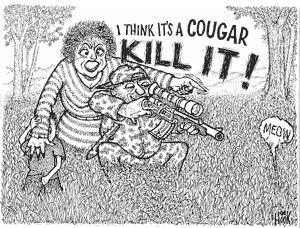 Richard Gaya saw this large cat twice in 2004 on his Buck's Elbow Mountain property. This photo was taken on his second sighting.
Richard Gaya saw this large cat twice in 2004 on his Buck's Elbow Mountain property. This photo was taken on his second sighting.
PHOTO BY RICHARD GAYA
So what if the closest "official" cougar population is in Florida? Over the objections of several Crozet residents who've believed for years that the big cats are here, state wildlife officials have long denied their presence, but there's now a photo that seems to show one.
Cougar sightings have been making headlines recently, and those who've seen the stealthy feline have expressed wonder and delight. But while many welcome the so-called "Crozet cougar," one Maryland man says the silent predator shouldn't be celebrated-- it should be driven out.
In a letter to the editor published in the August edition of the Crozet Gazette, Monrovia, Maryland resident Philip Anderson cautions Crozetians to reconsider their cougar-friendly attitude. "Human beings are natural prey to mountain lions when they share the same environment, which is happening now," wrote Anderson, who added that he has visited Crozet often and is considering relocating there.
Though only 108 mountain lion attacks have occurred since 1890, he wrote, 50 of them happened in the last 16 years-- three of them fatal. Sixty-seven percent of those deaths were children (which, by the Hook's calculation means two). Most of those attacks occurred in western states with established cougar populations, but Anderson fears a growing cougar population here could lead to deadly consequences. Indeed, the cougarinfo.com website lists a small but spectacular array of maulings and at least four deaths since 2001.
"If the people of Crozet were aware of a homicidal maniac loose in the neighborhood and nearby woods, and that he targeted children as his victims, and that he was so deranged as to devour his victims, what would the community do?" asked Anderson. "Await the loss of the first child or take preventive action?"
While Anderson admits in the letter that the cougar's behavior is "natural," and that it's not actually a homicidal maniac, he expressed hope that "the people of Crozet will educate themselves regarding the danger of this human predator so they may defend themselves and their children."
The backlash against Anderson was swift and furious.
"Who do you think you are to move to our community and 'call to eliminate this predator,'" writes Pattie Boden, owner of Charlottesville pet supply and training business Animal Connection, in one of six letters published in the Gazette's September issue.
"Mr. Anderson is considering relocating to Crozet from the Maryland/D.C. area, and all I can say is please, please don't," writes Judith Moore of Free Union. "Stay in the big city where you are more likely to be 'mangled' by one of your own kind rather than come here and impose your tyrannical views on our wildlife."
Other letter writers cite statistics that show deer pose a much bigger threat to humans by causing fatal car accidents. Cougars could help keep the soaring white tail deer population in Albemarle and surrounding counties in check and therefore save human lives, one writer suggests.
One letter purported to be written by the cougar itself. "Please be assured that should the deer, squirrels, rabbits, possum, etc. run out, I will restrict myself to eating only extremely unruly children, ugly pets, and people from Maryland," it promises. In reference to the Gazette's policy on referencing letter writers' locales, the cougar offers his "friend" David Wood's Crozet address.
Anderson, reached at home in Maryland, says he was surprised by the fiery responses.
"I tried not to take them personally," says Anderson, who says he's still considering moving down and doesn't regret potentially alienating his new neighbors. "If a child was killed down there and I hadn't said something, I would feel really awful," he says.
But those who have seen the cougar say Anderson is overreacting.
Richard Gaya has seen a cougar twice on his 10-acre Buck Mountain property; he captured it on film in 2004-- the same year the Hook published a local veterinarian's account of spotting a cougar while he was biking on the Blue Ridge Parkway. Gaya says he doesn't fear the animal.
Anderson's letter was "fun to read, but he's grossly misinformed," says Gaya, a member of the Nature Conservancy and an avid wildlife photographer who has placed cameras around his home to capture bear, bobcats, and any other wildlife that come into view.
"Cougars are deathly afraid of populated areas," Gaya says. Unlike black bears, which are frequently spotted in this area, "the cougar is a very stealthy, very reclusive animal. This one that I saw appeared and then disappeared."
Another man who believes he saw a cougar is Carl Rainy, who says he saw one in July in Crozet. But it was a sighting 15 years ago in Batesville with several friends that brought frustration after the sighting. "I called the game warden, and he said, 'Oh yeah, yeah, okay,' like we really didn't see anything," Rainy recalls.
With so many confirmed sightings, why won't wildlife officials admit the big cats are here?
"We keep hearing reports everywhere statewide about cougars," says Jerry Sims, Fredericksburg-based wildlife biologist and manager for the Virginia Department of Game and Inland Fisheries. But "never do we see a body," he says. "We just don't have any hard facts."
A photo can show a cougar, he admits, but where the picture was taken and whether it's a wild cougar or one that was being kept illegally as a pet is impossible to determine.
In fact, Sims says the most likely source of cougars in Virginia is not natural migration from the west or south, but captive cougars who have either escaped or were deliberately released. "There's an underground of illegally kept animals," he says. "We officially don't have a known reproducing population is the best way to put it."
Wherever the cougar or cougars come from, Sims concurs with Marylander Anderson that the cats, if they acclimate to humans as they have in the west, are dangerous. Gazette editor Mike Marshall, who published an editorial this month on the subject, points out that no one in Crozet is denying a cougar can be deadly.
For instance, Marlene Condon, a naturalist and writer who responded to Anderson in the Gazette, expresses disdain for Anderson's view, but admits she has changed her exercise schedule to avoid the cougar's natural hunting hours-- dawn and dusk.
"Educating yourself is what you do," she says. "You recognize that we do need large predators, and you learn about them so you can safely coexist with them."
Marshall agrees with Condon, and says that the letter writers' anger at Anderson isn't only about a cougar-- it's about something even more dangerous around Crozet's countryside: development.
"There's a whole subtext about newcomers," says Marshall. "Long-timers are stressed over growth pressures and what comes with that. We don't really want to be told how to live by people from other parts of the world."

#